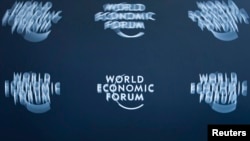A new report by the World Economic Forum ranks Switzerland as the most competitive country in the world, followed by Singapore and the United States.
As in previous years, countries in sub-Saharan Africa, including Chad, Guinea and Burundi hold up the bottom of the 144 countries surveyed in this latest edition of The Global Competitiveness, which assesses the competitiveness landscape of 148 economies.
Switzerland comes out on top for the sixth year in a row. The United States has moved up two places to third position in the competitiveness rankings. Completing the list of top 10 are five European countries plus Japan and Hong Kong.
Senior Economist at the World Economic Forum, Benat Bilbao, tells VOA very little separates the top 10 in the rankings.
Aided by technology, education
Bilbao said they all score high in areas such as structural reforms, health and primary education, and technological readiness.
"Smart investments in human capital, in talent and innovation are the key for competitiveness and this is something that we see it is a common and shared characteristic of all the countries in the top 10 of our ranking,” Bilbao said.
“In order to implement the structural reforms and engage in the smart investments that are important to boost competitiveness … the public sector and the private sector need to work hand-in-hand," he said.
The Global Competitiveness Report warns the health of the global economy is at risk as countries struggle to implement structural reforms necessary to help economies grow.
The report presents a mixed picture as to how well countries across different regions are pursuing the factors needed to boost their productivity and prosperity.
In Europe, the report finds a divide between a highly competitive North and countries in the South and East that are lagging behind in competitiveness.
The survey, which was conducted between March and May, does not reflect the growing tensions between Russia and Ukraine.
Ironically, the report notes both Russia and Ukraine have moved up 10 places in the rankings this year to 53rd and 76th, respectively.
Bilbao said a different picture is likely to emerge next year.
By the same token, Bilbao said instability in the Middle East has negatively affected economies there. He noted Syria and Iraq are not included in the rankings because of the impossibility of conducting a survey there. However, neighboring Lebanon has suffered from the fighting in the region, dropping 10 points to 113th position, he added.
Sub-Saharan Africa growth
The report finds sub-Saharan Africa continues to register impressive growth rates of close to 5 percent. However, only three countries, including Mauritius, South Africa and Rwanda score in the top half of the competitiveness rankings.
Bilbao said many African countries still occupy the bottom of the 144 ranked countries.
“What they have in common is not just that they are in turmoil, facing a difficult social and political situation or a health crisis,” he said.
“I think that what they have in common is … weak institutions, poor functioning of the markets and very low level of education that do not provide the necessary skills for their economies to actually move towards more productive activities,” Bilbao said.
A brighter note is struck by the Asian Tigers, who continue to live up to their name. The report calls the competitiveness dynamics in South-East Asia remarkable.
Besides 2nd-ranked Singapore, it finds the five largest countries -- Malaysia, Thailand, Indonesia, the Philippines and Vietnam -- all progressing in the rankings.
While China has moved up one place to number 28, Pakistan has put in a dismal performance coming in at number 129 in the global competition.
